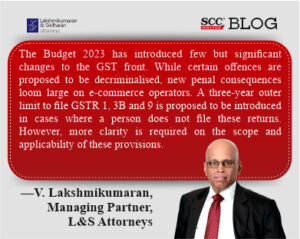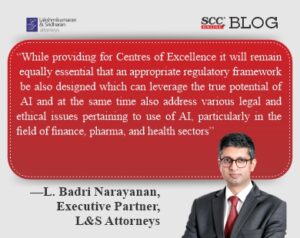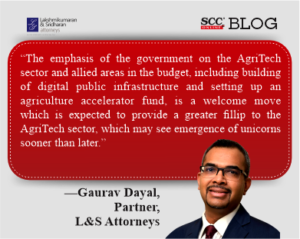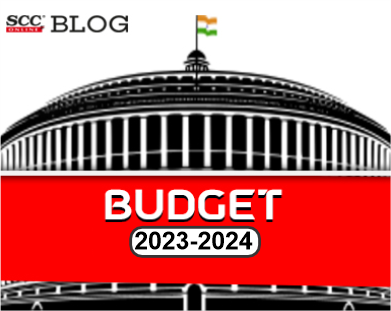On 1-02-2023, the Union Finance Minister, Nirmala Sitharaman announced the Union Budget 2023. The budget is particularly focused upon inclusive development, especially covering the youth, women, farmers, OBCs, Scheduled Castes and Scheduled Tribes.
Major highlights of India Union Budget 2023, including the vision, change in tax slabs, sector specific focus, allocation of budget, are provided below.
Vision of Union Budget 2023-24 – Saptarishi (7) Priorities
- Inclusive Development
- Reaching the Last Mile
- Infrastructure and Investment
- Unleashing the Potential
- Green Growth
- Youth Power
- Financial Sector
New Tax Slab 2023-24
|
Particulars/ S. No. |
Total Income (In Rs) |
Tax |
|
1 |
0-3 lakhs |
Nil |
|
2 |
3-6 lakhs |
5% |
|
3 |
6-9 lakhs |
10% |
|
4 |
9-12 lakhs |
15% |
|
5 |
12-15 lakhs |
20% |
|
6 |
Above 15 lakhs |
30% |
Items Getting Costly under Budget 2023-24
|
Commodity |
Specific Items |
|
Gems and Jewellery Sector |
Gold |
|
Silver |
|
|
Platinum |
|
|
Imitation Jewellery |
|
|
Automobiles |
Vehicle (including electric vehicles) in Semi-Knocked Down (SKD) form |
|
Vehicle in Completely Built Unit (CBU) form (other than with CIF more than USD 40,000 or with engine capacity more than 3000 cc for petrol-run vehicle and more than 2500 cc for diesel-run vehicles, or with both) |
|
|
Electrically operated Vehicle in Completely Built Unit (CBU) form (other than with CIF value more than USD 40,000) |
|
|
Others |
Bicycles |
|
Toys and parts of toys (other than parts of electronic toys) |
|
|
Compounded Rubber |
|
|
Electric Kitchen Chimney |
|
|
Cigarettes |
Union Budget 2023-24 Highlights
|
Name of Sector |
Proposals in Budget 2023 |
|
Health Sector
|
157 New Nursing Colleges to be established
|
|
Government to launch Sickle Cell Anemia elimination mission
|
|
|
Dedicated multidisciplinary courses for medical devices |
|
|
Agriculture and Cooperatives |
Building Digital Public Infrastructure as an open source, open standard and inter operable public good |
|
Agriculture Accelerator Fund aiming at bringing innovative and affordable solutions for challenges faced by farmers |
|
|
Targeted Funding of Rs 20 lakh Crore targeted at Animal Husbandry, Dairy and Fisheries
|
|
|
Sree Anna Making India Global hub for Millets with the support of Indian Institute of Millet Research (IIMR) |
|
|
Propose launch of Horticulture Clean Plant Program to boost production of high value horticultural crops |
|
|
Education and Skilling |
Revamping Teacher’s training via District Institutes of Education and Training |
|
Setup of National Digital Library for children and adolescents |
|
|
Encourage States to set up physical libraries at Panchayat and Ward levels |
|
|
Infrastructure and Investment |
Increased capital investment outlay by 33.4% to Rs 10 lakh crore |
|
Highest ever capital outlay of Rs 2.4 lakh crore for Railways |
|
|
100 transport infrastructure projects identified for end-to-end connectivity for ports, coal, steel, fertilizer sectors |
|
|
Information Technology |
Make AI in India by setting up 3 specialized centres in educational institutes |
|
Government to introduce National Data Governance Policy for enabling access to anonymized data for research by start-ups and academia |
|
|
Phase 3 of E-Courts to be launched for effective administration of Justice |
|
|
Set-up of Entity Digi-Locker for facilitating secure online storing and sharing of documents with business ecosystem |
|
|
Setting up 100 labs for 5G services |
|
|
R&D grant for Lab-Grown diamonds to reduce import dependency by encouraging domestic production |
|
|
MSMEs
|
‘Vivad se Vishwas’
|
|
Green Growth |
Mangrove Initiative for Shoreline Habitats & Tangible Incomes (‘MISHTI’)
|
|
GOBARdhan Scheme for establishment of 500 new ‘waste to wealth’ plants under |
|
|
Renewable Energy Evacuation with an investment of Rs 20,700 crore including central support of Rs. 8,300 crores |
|
|
Green Credit Programme to incentivize environmentally sustainable and responsive actions and mobilize additional resources |
|
|
National Green Hydrogen Mission targetting annual production of 5 MMT by 2030 |
|
|
PM PRANAM: Programme for Restoration, Awareness, Nourishment and Amelioration of Mother Earth |
|
|
Tourism
|
Estimated budget of Rs 1412 Cr for Integrated Development of Tourist Circuits around specific themes (Swadesh Darshan) |
|
Selection of at least 50 tourist destinations to be developed as a complete package for boosting tourism sector |
|
|
Financial Sector |
Set-up of National Financial Information Registry to enable efficient lending, promote financial inclusion and enhance financial stability |
|
Mahila Samman Bachat Patra – savings scheme for 2 years for women at fixed interest rate of 7.5% |
|
|
Enhanced maximum deposit limit for senior citizens savings scheme from Rs 15 lakhs to Rs 30 lakhs |
|
|
Setting up of Central Data Processing Centre for faster handling of administrative work under the Companies Act, 2013. |
|
|
Fiscal Management |
50-year Interest Free Loans to States |
|
Fiscal Deficit of 3.5% of Gross State Domestic Product (GSDP) allowed for States (0.5% tied to Power sector reforms) |
|
|
Fiscal Consolidation targeting Fiscal Deficit to be below 4.5% by 2025-26 |
|
|
Changes to Custom Duty on |
Import of capital goods for Li-ion battery manufacturing |
|
Import of mobile camera lens |
|
|
Denatured ethyl alcohol |
|
|
Seeds for lab-grown diamond manufacture |
|
|
Concessional duty on copper scrap to be continued |
|
|
Compounded rubber |
|
|
Personal Income Tax |
Limit for income tax rebate of income tax increased from Rs 5 lakhs to 7 lakhs |
|
Changes in income tax slabs |
|
|
Highest surcharge rate on income above Rs 5 Crore reduced from 37% to 25% |
|
|
Benefits of standard deduction extended to new tax regime for salaried class and pensioners |
|
|
Tax exemption limit extended to Rs 25 lakh on leave encashment on retirement for non-government salaried employees |
|
|
Tax Benefits for MSMEs |
Limits for micro-enterprises and professionals enhanced; 95% receipts to be non-cash |
|
Deduction on payments made to MSMEs will be allowed on actual payment |
|
|
Tax Benefits for Cooperatives |
15% corporate tax benefits extended to new co-operatives, commencing manufacturing till 31-03-2024 |
|
Higher limit of Rs 2 lakhs per member for deposits and loans in cash by Primary Agricultural Credit Society (PACS) and Primary Cooperative Agriculture and Rural Development Banks (PCARDBs) |
|
|
Higher limit of Rs 3 crore for Tax Deducted at Source (TDS) on cash withdrawal |
|
|
Tax Benefits for Startups |
Date of incorporation can be extended by one year for income tax benefits |
|
Benefit of carry-forward of losses on change of shareholding of start-ups from 7 to 10 years of incorporation |
|
|
Rationalization – Period of tax benefits extended to funds relocating to International Financial Services Centre (IFSC), Gujarat International Finance Tech-city (GIFT) till 31-03-2025. |
|
|
Reaching the Last Mile |
Government to launch Pradhan Mantri Development of Particularly Vulnerable Tribal Groups (PTVG) |
|
Financial assistance to drought prone regions of Karnataka for sustainable micro-irrigation |
|
|
Increased teacher recruitment for 740 Eklavya Model Residential Schools |
|
|
Setup of Bharat SHRI project for digitalization on ancient transcriptions |
|
|
Online Gaming |
Minimum threshold of Rs 10,000 for TDS removed. |
|
TDS and taxability on net winnings at the time of withdrawal or at the end of the financial year. |
|
|
TDS would be without the threshold of Rs 10,000. |
|
|
For lottery, crossword puzzles games, etc. threshold limit Rs 10,000 for TDS shall continue but shall apply to aggregate winnings during a financial year. |
Allocation to Specific Ministries
|
Ministry |
Allocation |
|
Ministry of Defense |
Rs 5.94 crore |
|
Ministry of Road Transport and Highways |
Rs 2.70 crore |
|
Ministry of Railways |
Rs 2.41 crore |
|
Ministry of Consumer Affairs, Food and Public Distribution |
Rs 2.06 crore |
|
Ministry of Home Affairs |
Rs 1.96 crore |
|
Ministry of Chemicals and Fertilizers |
Rs 1.78 crore |
|
Ministry of Rural Development |
Rs 1.60 crore |
|
Ministry of Agriculture and Farmer’s Welfare |
Rs 1.25 crore |
|
Ministry of Communications |
Rs 1.23 crore |
Scheme Wise Allocation in Budget 2023-24
|
Name of the Scheme |
Budget Estimates 2022-23 |
Budget Estimates 2023-24 |
|
Development of Pharmaceutical Industry |
Rs 100 crores |
Rs 1,250 crores |
|
Jal Jeevan Mission |
Rs 60,000 crores |
Rs 70,000 crores |
|
Eklavya Model Residential Schools |
Rs 2,000 crores |
RS 5,943 crores |
|
Pradhan Mantri Awas Yojana |
Rs 48,000 crores |
Rs 79,590 crores |
|
Scheme for Faster Adoption and Manufacturing of Electronic Vehicles (FAME) |
Rs 2,908 crores |
Rs 5,172 crores |
|
Nort East Special Infrastructure Development Scheme |
Rs 1,419 crores |
Rs 2,491 crores |
Legal Sector
|
SNO. |
LEGAL |
DETAIL |
|
1. |
Support for poor prisoners |
|
|
2. |
Mission Karmayogi / Ease of Doing Business
|
|
|
3. |
E-Courts
|
|
|
4. |
Vivad se Vishwas I – Relief for MSMEs
|
|
|
5. |
Vivad se Vishwas II – Settling Contractual Disputes |
|
|
6. |
Green Credit Programme |
|
|
7. |
GIFT IFSC Gujarat International Finance Tec-City International Financial Services Centres Authority
|
|
|
8. |
Improving Governance and Investor Protection in Banking Sector |
|
|
9. |
Central Data Processing Centre
|
|
|
10. |
Income Tax Act, 1961 (‘1961 Act’) |
|
|
11. |
Tax Appeals
|
|
|
12. |
Penalty for cash loan/transactions against primary co-operatives
|
|
|
13. |
Extending the scope for deduction of tax at source at lower or nil rate
|
|
|
14. |
Improving compliance and tax administration |
|
|
15. |
Rationalisation |
|
|
16. |
Micro, Small and Medium Enterprises Development Act, 2006 (‘2006 Act’) |
|
|
17. |
Amendments in the Customs Act, 1962 (‘1962 Act’)
|
|
|
18. |
Amendments in the provisions relating to Anti-Dumping Duty (ADD), Countervailing Duty (CVD), and Safeguard Measures |
|
|
19. |
Amendments in the First Schedule to the Customs Tariff Act, 1975
|
|
|
20. |
Amendment in the Second Schedule to the Customs Tariff Act, 1975 |
|
|
21. |
Decriminalization in GST Laws |
|
|
22. |
Facilitate e-commerce for micro enterprises.
|
|
|
23. |
Amendment to Schedule III of CGST Act, 2017
|
|
|
24. |
Return filing under GST |
|
|
25. |
Input Tax Credit for expenditure related to CSR |
|
|
26. |
Sharing of information
|
|
|
27. |
Amendments in section 2 clause (16) of IGST Act, 2017 |
|
|
28. |
Online information and database access or retrieval services
|
|
|
29. |
Place of supply in certain cases |
|
|
30. |
National Financial Information Registry |
|
Mathivanan N., Principal Partner (Lakshmikumaran & Sridharan) on CESTAT:
“The Authority for Advance Rulings constituted under the Income Tax Act, which was handling CST matters, was abolished long time back and no bench for the CST Appellate Tribunal matters was sitting for a very long time. Now, the Customs, Excise and Service Tax Appellate Tribunal (CESTAT) will be handling all the pending and fresh cases from the date on which the Finance Bill, 2023 receives the President’s assent. It is a big relief for the taxpayers having pending cases before the CST Appellate Tribunal.”
V. Lakshmikumaran, Managing Partner (Lakshmikumaran & Sridharan) on Goods and Services Tax (GST):
“The Budget 2023 introduced a few but significant changes to the GST front. The Finance Bill, 2023 proposes some clarificatory amendments aimed at aligning the text of law with the GST portal operations. A major overhaul relates to the denial of input tax credit on procurements made for fulfilling CSR obligations. While certain offences are proposed to be decriminalized, new penal consequences loom on e-commerce operators. A 3-year outer limit to file GSTR 1, 3B and 9 is proposed to be introduced in cases where a person does not file these returns. However, more clarity is required on the scope and applicability of these provisions. It is hoped that the next council meeting throws some light on the much-awaited constitution of the GST Tribunal and a possible amnesty scheme.”
relates to the denial of input tax credit on procurements made for fulfilling CSR obligations. While certain offences are proposed to be decriminalized, new penal consequences loom on e-commerce operators. A 3-year outer limit to file GSTR 1, 3B and 9 is proposed to be introduced in cases where a person does not file these returns. However, more clarity is required on the scope and applicability of these provisions. It is hoped that the next council meeting throws some light on the much-awaited constitution of the GST Tribunal and a possible amnesty scheme.”
S. Vasudevan, Executive Partner (Lakshmikumaran & Sridharan) on Income Tax:
“The new tax regime under Budget 2023 will benefit the growing middle class and encourage them to opt out of traditional deduction/ exemption-based regime to a simpler regime with moderate tax rates. Major changes have been proposed in taxation of winnings from online gaming, likely to increase the compliance burden for the sector. The Government has also paid attention to the taxpayers’ grievance regarding huge pendency of appeals before first appellate authority and has proposed amendments for quicker disposal of low value appeals.”
L. Badri Narayanan (Lakshmikumaran & Sridharan) on Online Gaming:
 “The Finance Bill 2023 completely overhauled the existing provisions related to winnings from online games and introduced specific provisions for taxation of winnings from online games and withholding tax obligations on gaming operators. Earlier, where there was no clarity on computation of winnings either from user perspective or from operator perspective. It is also relevant to note that earlier, there was a limit of winnings up to Rs. 10,000 per game, which has now been made per financial year.”
“The Finance Bill 2023 completely overhauled the existing provisions related to winnings from online games and introduced specific provisions for taxation of winnings from online games and withholding tax obligations on gaming operators. Earlier, where there was no clarity on computation of winnings either from user perspective or from operator perspective. It is also relevant to note that earlier, there was a limit of winnings up to Rs. 10,000 per game, which has now been made per financial year.”
Investments & Infrastructure
|
S. No. |
Investments & Infrastructure |
Details |
|
1. |
Fisheries |
A new sub-scheme of PM Matsya Sampada Yojana with targeted investment of Rs. 6,000 crores will be launched. It will enable activities of fishermen, fish vendors, and micro & small enterprises, improve value chain efficiencies, and expand the market.
|
|
2. |
Cooperative based economic development model |
|
|
3. |
Pharma Innovation |
|
|
4. |
Capital Investment as driver of growth and jobs |
|
|
5. |
Effective Capital Expenditure |
It is budgeted at 13.7 lakh crores (4.5 % of GDP) |
|
6. |
Support to State Governments for Capital Investment |
|
|
7. |
Enhancing opportunities for private investment in Infrastructure |
The newly established Infrastructure Finance Secretariat will assist all stakeholders for more private investment in infrastructure, including railways, roads, urban infrastructure and power, which are predominantly dependent on public resources.
|
|
8. |
Logistics |
|
|
9. |
Energy Transition |
|
|
10. |
Renewable Energy Evacuation |
|
|
11. |
GOBARdhan Scheme (Galvanizing Organic Bio-Agro Resources Dhan) |
|
|
12. |
Harmonized master List of Infrastructure |
An expert committee will review it for recommending the classification and financing framework suitable for Amrit Kaal.
|
|
13. |
Railways |
|
|
14. |
Regional Connectivity |
50 additional airports, heliports, water aerodromes and advance landing grounds will be revived for improving regional air connectivity |
|
15. |
Sustainable Cities of Tomorrow |
Meaning- efficient use of land resources, adequate resources for urban infrastructure, transit-oriented development, enhanced availability and affordability of urban land, and opportunities for all |
|
16. |
Making Cities ready for Municipal Bonds |
Through property tax governance reforms and ring-fencing user charges on urban infrastructure, cities will be incentivized to improve their credit worthiness for municipal bonds |
|
17. |
Urban Infrastructure Development Fund |
|
|
18. |
Urban Sanitization |
|
|
19. |
Fifty- year interest free loan to States |
|
Banking Sector
|
S. No. |
Banking |
Details |
|
1. |
Improving Governance & Investor Protection in Banking Sector |
|
|
2. |
Capacity Building in Securities Market |
|
Financial Sector
|
S. No. |
Financial Sector |
Details |
|
1. |
Credit Guarantee for MSMEs |
|
|
2. |
National Financial Information Registry |
|
|
3 |
Financial Sector Regulations |
|
|
4 |
Gift IFSC |
To enhance business activities:
|
|
5 |
Improving Governance & Investor Protection in Banking Sector |
|
|
6 |
Capacity Building in Securities Market
|
|
|
7 |
Central Data Processing Centre |
This Center will be set up for faster response to companies through centralized handling of various forms filed with field offices under the Companies Act. |
|
8 |
Reclaiming of shares and dividends |
An integrated IT portal will be established for investors to reclaim unclaimed shares and unpaid dividends from the Investor Education and Protection Fund Authority with ease. |
|
9 |
Digital Payments |
|
|
10 |
Data Embassy |
|
|
11 |
Azadi Ka Amrit Mahotsav Mahila Samman Bachat Patra |
|
|
12 |
Senior Citizens |
|
|
13 |
Fiscal Deficit of States |
|
|
14 |
Revised Estimates 2022-2023 |
|
|
15 |
Budget Estimates 2023-2024 |
|
Information Technology Sector
|
S. No. |
Information Technology |
Details |
|
1 |
Digital Public Infrastructure for Agriculture |
|
|
2 |
National Digital Library for Children and Adolescents |
|
|
3 |
Bharat Shared Repository of Inscriptions |
It will be set up in a digital epigraphy museum, with digitization of 1 lakh ancient inscriptions in the first stage. |
|
4 |
Centres of Excellence for Artificial Intelligence |
|
|
5 |
National Data Governance Policy |
|
|
6 |
Simplification of Know Your Customer (KYC) process |
|
|
7 |
One stop solution for identity and address updating |
A one stop solution for reconciliation and updating of identity and address of individuals maintained by various government agencies, regulators and regulated entities will be established using DigiLocker service and Aadhaar as foundational identity.
|
|
8 |
Common Business Identifier |
|
|
9 |
Unified Filing Process |
|
|
10 |
E- Courts |
|
|
11 |
Fintech Services |
|
|
12 |
Entity DigiLocker |
|
|
13 |
5G Services |
|
|
14 |
Lab Grown Diamonds |
|
|
15 |
Skill India Digital Platform |
|
|
16 |
Digital Payments |
|
Hemant Krishna (Lakshmikumaran & Sridharan) on Fin-Tech:
 “Creation of digital public infrastructure is a revolutionary approach to boost the fintech ecosystem in the long run. The fact that the Budget also spoke of measures to improve bank governance and enhance investor protection shows that the Government is committed to walking an ever-thinning line between facilitating innovation and enabling harm.”
“Creation of digital public infrastructure is a revolutionary approach to boost the fintech ecosystem in the long run. The fact that the Budget also spoke of measures to improve bank governance and enhance investor protection shows that the Government is committed to walking an ever-thinning line between facilitating innovation and enabling harm.”
Agriculture and Cooperation
|
Sno. |
Agriculture and Cooperation |
Details |
|
1. |
Digital public infrastructure |
|
|
2. |
Agriculture Accelerator Fund
|
|
|
3. |
Enhancing productivity of cotton crop
|
|
|
4. |
Atmanirbhar Horticulture Clean Plant Program |
|
|
5. |
Global Hub for Millets: ‘Shree Anna’
|
|
|
6. |
Agriculture Credit |
|
|
7. |
Fisheries |
|
|
8. |
Marine products
|
|
|
9. |
Cooperation |
|
|
10. |
Bhartiya Prakritik Kheti Bio-Input Resource Centres |
|
Gaurav Dayal (Lakshmikumaran & Sridharan) on Agri-Tech
“The data in the Economic Survey 2022-23 showcases AgriTech sector to be a sunrise sector in India for the last 5 years. The emphasis of the government on the AgriTech sector and allied areas in the budget, including building of  digital public infrastructure and setting up an agriculture accelerator fund, is a welcome move which is expected to provide a greater fillip to the AgriTech sector, which may see emergence of unicorns sooner than later. The Government’s primary goal to use creative and AI based technologies in agriculture and allied industries, as reflected in this budget, is expected to work to overall benefit of all relevant stakeholders.
digital public infrastructure and setting up an agriculture accelerator fund, is a welcome move which is expected to provide a greater fillip to the AgriTech sector, which may see emergence of unicorns sooner than later. The Government’s primary goal to use creative and AI based technologies in agriculture and allied industries, as reflected in this budget, is expected to work to overall benefit of all relevant stakeholders.
Health, Education and Skilling
|
Sno. |
Health, Education and Skilling |
Details |
|
1. |
Medical & Nursing Colleges
|
|
|
2. |
Sickle Cell Anemia Elimination Mission
|
|
|
3. |
Medical Research
|
|
|
4. |
Pharma Innovation
|
|
|
5. |
Multidisciplinary courses for medical devices |
|
|
6. |
Teachers’ Training
|
|
|
7. |
National Digital Library for Children and Adolescents
|
|
|
8. |
Eklavya Model Residential Schools |
|
Women Empowerment and Senior Citizens
|
Sno. |
Women Empowerment and Senior Citizens |
Detail |
|
1. |
Enable groups like Deendayal Antyodaya Yojana National Rural Livelihood Mission |
|
|
2. |
Azadi Ka Amrit Mahotsav Mahila Samman Bachat Patra |
|
|
3. |
Senior Citizens
|
|
New Schemes and Enhancement in Existing Schemes
|
Sno. |
New Schemes and enhancement in existing schemes |
Detail |
|
1. |
PM Garib Kalyan Anna Yojana |
|
|
2. |
PM VIKAS- PM Vishwakarma Kaushal Samman |
|
|
3. |
PM Matsya Sampada Yojana |
|
|
4. |
PVTGs Pradhan Mantri particularly vulnerable tribal groups |
|
|
5. |
Water for Drought Prone Region of Karnataka
|
|
|
6. |
PM Awas Yojana |
|
|
7. |
PM-PRANAM PM Programme for Restoration, Awareness, Nourishment and Amelioration of Mother Earth |
|
|
8. |
GOBARdhan scheme Galvanizing Organic Bio-Agro Resources Dhan |
|
|
9. |
MISHTI Mangrove Initiative for Shoreline Habitats & Tangible Incomes |
|
|
10. |
Amrit Dharohar
|
|
|
11. |
Youth Power |
|
|
12. |
Pradhan Mantri Kaushal Vikas Yojana 4.0 |
|
|
13. |
Credit Guarantee Scheme for MSMEs
|
|
*Kriti Kumar, Ridhi Khurana and Simran Singh, Editorial Assistant(s) has worked on the report.







